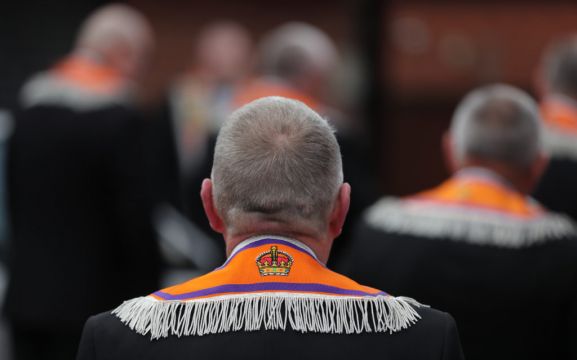The chief executive of Northern Ireland's Protestant Orange Order does not sense any appetite among pro-British unionists to turn the July 12th peak of the annual marching season violent, despite "a huge amount of frustration and anger" over Brexit.
Tens of thousands of Northern Irish unionists take part in parades every year, both large and small, with the main gathering each July 12th celebrating the 1690 victory at the Battle of the Boyne by Protestant King William of Orange over Catholic King James of England and Scotland.
They have often been the spark for sectarian tensions and street violence, even after the 1998 Belfast Agreement, and are being carefully watched this year after anger over the trade barriers introduced by the Brexit Northern Ireland protocol contributed to more than a week of riots in April.
Wrecking your own areas will not fix the protocol
"We're not picking up any particular appetite. The 12th parades are the 12th parades, there's always a wee bit of increased tension in some areas but we don't have any particular concerns," Orange Order chief executive Iain Carlisle told Reuters in an interview.
"Whilst there is frustration and we appreciate that, I don't think it's something that's going to manifest itself around our events... Our message to people is the protocol is a political problem, it needs to be solved politically. Wrecking your own areas will not fix the protocol."
Local parades
The 35,000-member Protestant organisation cancelled all parades last year due to the Covid-19 pandemic and are planning to hold smaller, local parades this year that will finish earlier to take account of ongoing restrictions.
The main predominantly Catholic, pro-united Ireland parties, who share power in the region with their unionist rivals, support the protocol though also say some changes are needed to win support across Northern Ireland's communities.
Mr Carlisle, who joined the more than 200-year-old organisation as a teen, said the parades will not double up as protests against the checks introduced on some goods moving from mainland Britain to Northern Ireland as the province still borders the EU via member state the Irish Republic.
We put great faith in the political system and the strength of the union and sometimes that feels a bit like unrequited love
Advertisement
However, he expects the steady stream of protests against the protocol to become larger as restrictions ease and he shares the feelings of many that part of his identity is being erased by being treated differently to the rest of the United Kingdom.
"It's a further illustration that the British government values our relationship less than we do," Mr Carlisle said at the Museum of Orange Heritage where visitors can buy Lego figures dressed in the traditional black bowler hat and orange sash and are advised to socially distancing by orange painted signs.
"We put great faith in the political system and the strength of the union and sometimes that feels a bit like unrequited love."
'Stark choice'
The EU and Britain agreed a temporary fix last week to one of the contentious aspects of the protocol in a bid to ease tensions ahead of the July 12th parades and London intends to lay out its plan for a more permanent solution in the coming weeks.
Mr Carlisle said British prime minister Boris Johnson faces a stark choice with the future of the union between England, Northern Ireland, Scotland and Wales on the line.
"The prime minister sees himself as the next Winston Churchill type figure, we're not seeing any evidence of that. If he keeps on this course, he will be the prime minister that really sits over the breakup of the union as we know it," he said.
"The prime minister has a very stark choice to make in the coming weeks around the demands of the European Union."







